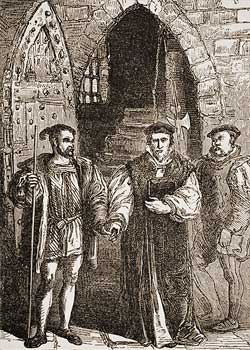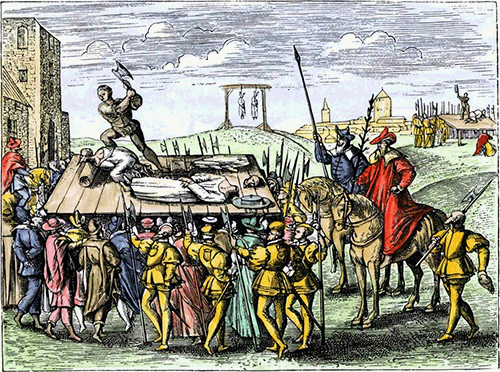|
|
|
|

The Death of Bishop Fisher
After the lieutenant of the Tower had received the writ for his execution, because it was then very late, and the prisoner asleep, he was loath to dis-ease him from his rest. But in the morning, before five of the clock, he came to him in his chamber, in the Bell-tower, finding him yet asleep in his bed, and waking him, told him, he was come to him on a message from the king, to signify unto him, that his pleasure was he should suffer death that forenoon. "Well," quoth the bishop, "if this be your errand, you bring me no great news; for I have looked a long time for this message, and I must humbly thank his Majesty, that it pleaseth him to rid me from all this worldly business. Yet let me by your patience sleep an hour or two; for I have slept very ill this night, not for any fear of death, I thank God, but by reason of my great infirmity and weakness."
"The king's pleasure is farther," said the lieutenant, "that you shall use as little speech as may be, especially of any thing touching his Majesty, whereby the people should have any cause to think of him, or his proceedings, otherwise than well." "For that," said he, "you shall see me order myself, as, by God's grace, neither the king, nor any man else, shall have occasion to mislike of my words." With which answer the lieutenant departed from him; and so the prisoner, falling again to rest, slept soundly two hours and more; and, after he was awaked, called to his man to help him up; but first commanded him to take away his shirt-of-hair, which customably he wore, and to convey it privily out of the house; and, instead thereof, to lay him forth a clean white shirt, and all the best apparel he had, as cleanly brushed as might be. And, as he was arraying himself, his man, seeing in him more curiosity and care for the fine and cleanly wearing of his apparel that day, than was wont, demanded of him, what this sudden change meant, saying, that his lordship knew well enough, that he must put off all again within two hours, and lose it. "What of that?" said he: "Dost not thou mark, that this is our marriage-day? and that it behoveth us therefore to use more cleanliness for solemnity thereof?"
About nine of the clock the lieutenant came again, and, finding him almost ready, said, he was now come for him. Then said he to his man, "Reach me my furred tippet to put about my neck." "O, my lord!" said the lieutenant, "what need ye be so careful for your health for this little time, being, as yourself knows, not much above an hour?" "I think no otherwise," said, he, "but yet, in the mean time, I will keep myself as well as I can. For I tell you truth; though I have, I thank our Lord, a very good desire and willing mind to die at this present, and so trust of his infinite mercy and goodness he will continue it, yet will I not willingly hinder my health in the mean time one minute of an hour, but still prolong the same, as long as I can, by such reasonable ways and means as Almighty God hath provided for me." And, with that, taking a little book in his hand, which was a New Testament lying by him, he made a cross on his forehead, and went out of his prison-door with the lieutenant, being so weak as that he was scant able to go down the stairs; wherefore, at the stairs' foot he was taken up in a chair between two of the lieutenant's men, and carried to the Tower-gate, with a great number of weapons about him, to be delivered to the sheriff of London for execution.
And, as they were come to the uttermost precinct of the liberties of the Tower, they rested there with him a space, till such time as one was sent before to know in what readiness the sheriffs were to receive him; during which space he rose out of his chair, and standing on his feet, leaned his shoulder to the wall, and lifting his eyes towards heaven, he opened a little book in his hand, and said, "O Lord! this is the last time that ever I shall open this book; let some comfortable place now chance unto me, whereby I thy poor servant may glorify thee in this my last hour." And, with that, looking into the book, the first thing that came to his sight were these words: Hæc est autem vita &aeterna, ut cognoscant te solum verum Deum, et quem misisti Jesum Christum. Ego te glorificavi super terram, opus consummavi quod dedisti mihi, etc., John xvii. 3, &c.;1 and with that he shut the book together, and said, "Here is even learning enough for me to my life's end." And so, the sheriff being ready for him, he was taken up again among certain of the sheriff's men, with a new and much greater company of weapons than was before, and carried to the scaffold on the Tower-hill, otherwise called East Smithfield, himself praying all the way, and recording upon the words which he before had read.
When he was come to the foot of the scaffold, they that carried him offered to help him up the stairs; but, said he, "Nay, masters, seeing I am come so far, let me alone, and ye shall see me shift for myself well enough!" and so went up the stairs without any help, so lively that it was a marvel to them that before knew his debility and weakness. But as he was mounting the stairs, the south-east sun shined very bright in his face; whereupon he said to himself these words, lifting up his hands, Accedite ad eum et illuminamini, et facies vestræ non confundentur.2 By that time he was upon the scaffold it was about ten o'clock; where the executioner, being ready to do his office, kneeled down to him, as the fashion is, and asked him forgiveness. "I forgive thee," said he, "with all my heart, and I trust thou shall see me overcome this storm lustily." Then was his gown and tippet taken from him, and he stood in his doublet and hose in sight of all the people, whereof there was no small number assembled to see the execution.
Being upon the scaffold, he spake to the people in effect as followeth:—"Christian people, I am come hither to die for the faith of Christ's holy catholic church; and, I thank God, hitherto my stomach hath served me very well thereunto, so that yet I have not feared death; wherefore I desire you all to help and assist with your prayers, that, at the very point and instant of death's stroke, I may in that very moment stand steadfast without fainting in any one point of the catholic faith, free from any fear. And I beseech Almighty God of his infinite goodness to save the king and this realm, and that it may please him to hold his holy hand over it, and send the king a good council." These words he spake with such a cheerful countenance, such a stout and constant courage, and such a reverent gravity, that he appeared to all men, not only void of fear, but also glad of death.

The Beheading of John Fisher and Countess of Salisbury
After these few words by him uttered, he kneeled down on both his knees, and said certain prayers. Among which, as some reported, one was the hymn of Te Deum laudamus to the end; and the psalm, In te, Domine, speravi. Then came the executioner and bound an handkerchief about his eyes; and so the bishop, lifting up his hands and heart to heaven, said a few prayers, which were not long, but fervent and devout: which being ended, he laid his head down over the midst of a little block, where the executioner, being ready with a sharp and heavy axe, cut asunder his slender neck at one blow; which bled so abundantly, that many, saith my author, wondered to see so much blood issue out of so lean and slender a body, though, in my judgment, that might rather have translated the wonder from his leanness to his age, it being otherwise a received tradition, that lean folk have the most blood in them.
Thus died John Fisher, in the seventy-seventh year of his age, on the two-and-twentieth of June, being St. Alban's day.
[Translations from the KJV:
1. John 17:3-4. "And this is life eternal, that they might know thee the only true God, and Jesus Christ, whom thou hast sent. I have glorified thee on the earth: I have finished the work which thou gavest me to do."
2. Psalm 33:5. "They looked unto him, and were lightened: and their faces were not ashamed."]
Excerpted from:
Fuller, Thomas. The Church History of Britain, Vol 2.
London: Thomas Tegg, 1842. 61-63.
 | to Bishop John Fisher |
 | to Luminarium Main |
 | to Renaissance English Literature |
 | to Renaissance Religious Writers |
 | to Luminarium Encyclopedia |
Site copyright ©1996-2018 Anniina Jokinen. All Rights Reserved.
Created by Anniina Jokinen on June 19, 2009. Last updated December 13, 2018.
|
|
The Tudors
King Henry VII
Elizabeth of York
King Henry VIII
Queen Catherine of Aragon
Queen Anne Boleyn
Queen Jane Seymour
Queen Anne of Cleves
Queen Catherine Howard
Queen Katherine Parr
King Edward VI
Queen Mary I
Queen Elizabeth I
Henry Fitzroy, Duke of Richmond
Renaissance English Writers
Bishop John Fisher
William Tyndale
Sir Thomas More
John Heywood
Thomas Sackville
Nicholas Udall
John Skelton
Sir Thomas Wyatt
Henry Howard
Hugh Latimer
Thomas Cranmer
Roger Ascham
Sir Thomas Hoby
John Foxe
George Gascoigne
John Lyly
Thomas Nashe
Sir Philip Sidney
Edmund Spenser
Richard Hooker
Robert Southwell
Robert Greene
George Peele
Thomas Kyd
Edward de Vere
Christopher Marlowe
Anthony Munday
Sir Walter Ralegh
Thomas Hariot
Thomas Campion
Mary Sidney Herbert
Sir John Davies
Samuel Daniel
Michael Drayton
Fulke Greville
Emilia Lanyer
William Shakespeare
Persons of Interest
Cardinal Thomas Wolsey
Archbishop Thomas Cranmer
Thomas Cromwell
John Fisher, Bishop of Rochester
Cardinal Lorenzo Campeggio
Cardinal Reginald Pole
Stephen Gardiner, Bishop of Winchester
William Tyndale
Pico della Mirandola
Desiderius Erasmus
Christopher Saint-German
Thomas Linacre
William Grocyn
Hugh Latimer
Elizabeth Barton, the Nun of Kent
For more, visit Encyclopedia
Historical Events
Field of the Cloth of Gold, 1520
Pilgrimage of Grace, 1536
The Babington Plot, 1586
The Spanish Armada, 1588
Government
Oath of Supremacy
The Act of Supremacy, 1534
The First Act of Succession, 1534
The Third Act of Succession, 1544
The Ten Articles, 1536
The Six Articles, 1539
The Second Statute of Repeal, 1555
Images of London:
London in the time of Henry VII. MS. Roy. 16 F. ii.
London, 1510, earliest view in print
Map of England from Saxton's Descriptio Angliae, 1579
Location Map of Elizabethan London
Plan of the Bankside, Southwark, in Shakespeare's time
Detail of Norden's Map of the Bankside, 1593
Bull and Bear Baiting Rings from the Agas Map (1569-1590, pub. 1631)
Sketch of the Swan Theatre, c. 1596
Westminster in the Seventeenth Century, by Hollar
Visscher's Panoramic View of London, 1616. COLOR
For more, visit Encyclopedia
|
|